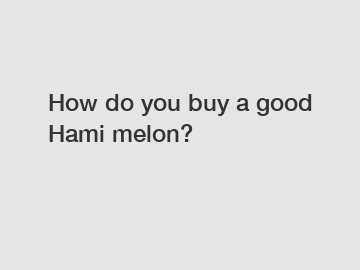How do you buy a good Hami melon?
Deliciously sweet and refreshingly juicy, Hami melons have long been celebrated for their exceptional taste and enticing aroma. These delectable fruits, hailing from the Xinjiang region of China, are sought after worldwide. However, selecting a good Hami melon can be a daunting task for both amateurs and seasoned buyers. Fret not! In this guide, we will unveil the secrets behind choosing the finest Hami melon, ensuring ultimate satisfaction in every bite.
1. The Importance of Appearance:
When it comes to Hami melons, appearance plays a crucial role in determining its quality. Examine the outer skin closely; it should be perfectly smooth, unblemished, and free of cracks. A well-ripened melon will have a bright, consistent golden color that signifies optimal ripeness. Beware of any green patches, as they indicate an underripe fruit.

2. Size Matters:
Consider the size of the Hami melon you're eyeing. While it might be tempting to believe that bigger is better, the truth lies in striking a balance. A good Hami melon should have a size that feels heavy for its relative dimensions. It should also feel firm when gently pressed but not overly firm, indicating an underripe fruit.
3. Sniffing Out the Fragrance:
A sensory delight, the aroma emitted by a ripe Hami melon is a significant indicator of its quality. Pick up the melon, bring it close to your nose, and take a deep breath. A mature, top-quality Hami melon should emit a sweet, floral fragrance that tantalizes your senses. Steer clear of melons with no discernible aroma, as they might not meet your expectations.
4. Stem and Skin:
The stem of a Hami melon provides another useful clue. A well-grown melon will have a stem that is slightly sunken, indicating it has naturally separated from the fruit. This separation is a sign of maturity, indicating that the melon is ripe and ready to be enjoyed. Additionally, check for a velvety texture on the outer skin. A smooth, slightly sticky texture indicates optimal ripeness, while a dry or rough surface may indicate an aged or inferior product.
5. The Shake Test:
One traditional way to determine the ripeness of a Hami melon is by gently shaking it. Listen closely for a slight rattling sound when you shake the fruit. An audible sound is an indication that the flesh inside the melon has started to separate from the rind, suggesting ideal ripeness. However, exercise caution when performing this test, as too much shaking may result in bruising or damage.
6. Seek Advice and Expertise:
When in doubt, don't hesitate to seek guidance from experienced vendors or local farmers. They possess invaluable knowledge and insights that can enhance your understanding of how to choose the best Hami melons. Having an expert by your side will help you make an informed decision, guaranteeing the tastiest and most rewarding purchase.
Conclusion:
Selecting a ripe and flavorful Hami melon doesn't require a stroke of luck; it demands attention to detail, trust in your senses, and a dash of wisdom. By following these guidelines, you'll be well-equipped to identify the telltale signs of a superior quality Hami melon. Whether you're preparing it as a refreshing salad, blending it into a delicious smoothie, or enjoying it as a standalone treat, your purchase will culminate in a truly delightful experience. Embrace the art of selecting a good Hami melon, and unlock a world of sweet, juicy satisfaction!
For more hybrid melon seeds, Wholesale Hot Pepper Varieties Seeds, Classic Hybrid Eggplant Seedsinformation, please contact us. We will provide professional answers.
80
0
0

Comments
All Comments (0)